Thoroughness
Knowing what factors will diminish the effectiveness of my work or words if neglected
PROVERBS 18:15
A PRIEST WISELY MANAGES HIS ASSIGNMENT
“And I said unto them, Ye are holy unto the Lord; the vessels are holy also; and the silver and the gold are a freewill offering unto the Lord God of your fathers. Watch ye, and keep them, until ye weigh them before the chief of the priests and the Levites, . . . in the chambers of the house of the Lord.”
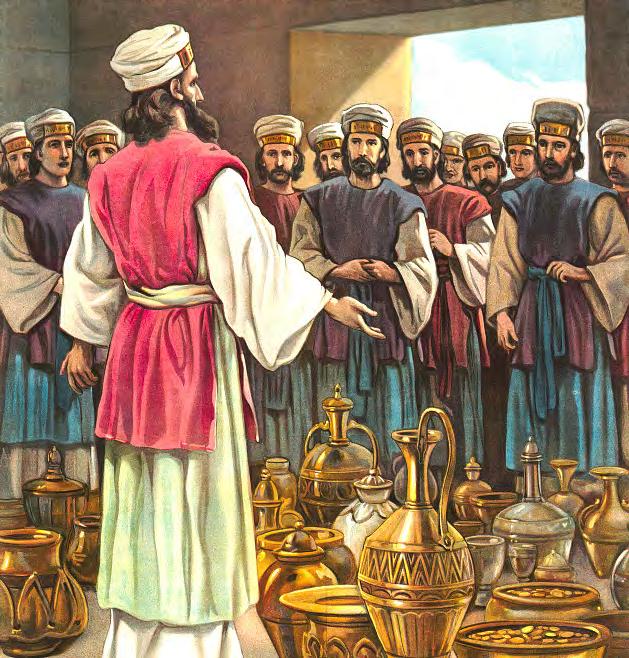
EZRA 8:28–29
SPIRITUAL GIFT: Teacher

BIBLICAL CHARACTER ILLUSTRATED CURRICULUM
Illustrated in Scripture, Illustrated in Life
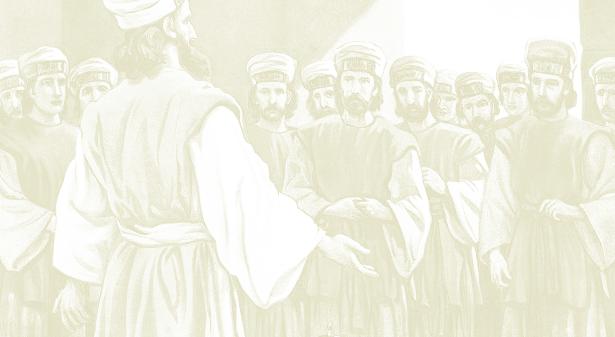
“The heart of the prudent getteth knowledge; and the ear of the wise seeketh knowledge.”
CONTENTS
2 Introduction
2 How to Use This Curriculum
3 Goals and Objectives
4 Character Quality Overview
5 Thoroughness in Scripture
6 Lesson 1: Carefully Manage
My Responsibilities
7 Bible Story: A Priest Wisely Manages His Assignment
8 Memory Verse: Proverbs 22:29
9 Activity: Ezra’s Scale
10 Lesson 2: Pay Attention to Details
11 Bible Story: The Night the Destroyer Passed through Egypt
12 Memory Verse: Proverbs 18:15
13 Activity: Calculator Race
14 Lesson 3: Make Needed Corrections
15 Bible Story: God Gives Gideon a New Strategy
16 Memory Verse: Romans 12:2
17 Activity: Help the Zookeeper Course-Correct
18 Lesson 4: Finish What I Start
19 Bible Story: Solomon Undertakes a Magnificent Work!
20 Memory Verse: Luke 14:28
21 Activity: Word Search
22 Additional Resources
22 Thoroughness GEMs






23 Journal and GEM Mine
24 Hymn Sheet Music: “Complete in Thee”
25 Hymn History: “Complete in Thee” by Aaron R. Wolfe
26 Explaining Salvation to a Child
27 Reproducible Coloring Pages
31 Recommended Resources


Biblical Character Illustrated Curriculum
Illustrated in Scripture
“The testimony of the Lord is sure, making wise the simple” (Psalm 19:7b). Biblical character is illustrated in this curriculum through both artwork and lessons from the lives of people in God’s Word. We most often benefit from the positive examples of faithful men and women. “For whatsoever things were written aforetime were written for our learning, that we through patience and comfort of the scriptures might have hope” (Romans 15:4). There were also people in the Bible who are representations of poor character, and we can learn from their lives as well. “Now these things were our examples, to the intent we should not lust after evil things, as they also lusted” (I Corinthians 10:6). We would be wise to learn from the testimonies God has given us in Scripture.
Illustrated in Life
“Faith cometh by hearing, and hearing by the word of God” (Romans 10:17). Hearing the Word of God causes us to grow in faith. This curriculum offers many practical applications of God’s Word to everyday life. “But be ye doers of the word, and not hearers only” (James 1:22). As God enables us to act in faith, our lives as believers will illustrate His character to others.
The character of God is illustrated in Scripture. May it also be illustrated in our lives.
Character Quality Overview

What Is Thoroughness?


Read aloud and discuss what thoroughness means and how it applies to life.
Theoperational definition of thoroughness is “knowing what factors will diminish the effectiveness of my work or words if neglected.” To do a job well, you must first identify the end goal. Then, consider what is needed, called “factors,” to accomplish that goal successfully. You may need certain tools, stepby-step plans, or experienced people to assist you. Other factors may be discerning the amount of time needed or the expected level of detail. For example, a person who is thorough listens attentively to instructions and keeps deadlines in mind. When speaking, he relays all important, relevant information in order to communicate the full situation and not mislead. He works efficiently and cleans up completely after a project. Thoroughness involves thinking ahead and committing to do whatever it takes to ensure that every part of an assignment is completed— even if additional time, effort, or care is required. The opposite of thoroughness is incompleteness. If a project is left unfinished, it is incomplete, and the time and effort that were invested are wasted. Projects that are finished but were done in a disorganized or hurried way may actually be incomplete, possibly hazardous, and will likely require additional time and work later. For example, if someone carelessly wipes the kitchen
table, some crumbs will likely be missed. The job will be incomplete. If he runs off to play, he may be called to come back to do the job correctly. A task might not be finished on time if someone dawdles, becomes overwhelmed with unnecessary details (perfectionism), or procrastinates. Other jobs may not be done thoroughly because a person lacks focus, “cuts corners,” or neglects to check his work.
Have you considered that God completes what He starts and that details are an important part of His plan? God is also thorough in His dealings with us, and He finishes the work He begins in believers. “. . . He which hath begun a good work in you will perform it until the day of Jesus Christ” (Philippians 1:6). One way God works in you is by giving you daily opportunities to build habits of thoroughness while you are young. You can learn to be thorough as you complete small tasks, such as putting away your toys after playing. As you grow older, you are assigned chores and schoolwork. When you are careful to use correct punctuation and spelling in your writing, you form good habits that later will make your written communication more effective. Let God continue His work in your life by thoroughly completing the tasks He gives you to do today.
Just as a jigsaw puzzle is incomplete without all the pieces, so our work will be incomplete if any of the necessary factors are missing or omitted.

4
A thorough person carefully considers details, methods, and deadlines that will help him complete his work effectively.
Thoroughness in Scripture
THOROUGHNESS KEY VERSE
As you read and study God’s Word, you will see Who He is! Be willing to be changed by Him so Christ can be seen through your life and others will glorify God.
The Character of God
We see examples of thoroughness in God’s character in the following ways:
• God always finishes His work.
(See Genesis 2:1–2, John 17:4, Philippians 1:6.)

• God gave thorough instructions for the specific design of the priests’ clothing.
(See Exodus 28:31–33.)
• God is attentive to details: He sees every sparrow, and He has numbered every hair on each person’s head.
(See Luke 12:6–7.)
• Jesus fulfilled the details of every prophecy of His life on earth.
(See Luke 24:44.)
• Jesus forgives absolutely and saves entirely.
(See Psalm 103:12, Hebrews 7:25.)
• The Spirit of God equipped Bezaleel with all that he needed to effectively complete the work he had been assigned.
(See Exodus 31:2–4.)
• The Holy Spirit fills Christians for life and powerful ministry.
(See Ephesians 5:18–21, Acts 1:8.)
“The heart of the prudent getteth knowledge; and the ear of the wise seeketh knowledge.”
PROVERBS 18:15
Thoroughness in My Life
Now let’s examine some ways God wants us to live out thoroughness daily.
• What should I do before I start planning a project?

(See Proverbs 16:3, Luke 14:28.)
• Do I find myself working hard only when I am aware that someone is watching? How can I overcome this inconsistency?
(See Colossians 3:22–24.)
• What thoroughly equips me for a life of good works?
(See II Timothy 3:16–17.)
• What one factor determines if my work is effective in God’s sight?
(See I Corinthians 13:1–3.)
• How can I thoroughly cleanse my heart and mind?
(See Psalm 32:5, 119:9; James 5:16.)
• How is it possible for me to be fully prepared for the return of Christ?
(See I Thessalonians 5:23.)
• How can I live my life completely for the Lord?
(See Joshua 22:5.)
• What details are important to remember when partaking of the Lord’s Supper?
(See I Corinthians 11:26–30.)
5
Carefully Manage My Responsibilities
If you are asked to care for a pet, you show good management skills by caring for its various needs at the right times. A dog must be fed, exercised, and bathed regularly. Don’t wait until the dog food is gone to add it to the shopping list! What are your responsibilities? How can you manage them well? First, consider what is most important to do today. Include your personal hygiene, daily chores, and schoolwork. Then decide the best order, time, and way to do your tasks, and pay attention to details! Track your progress on each assignment and doublecheck your work. Jesus praises and rewards those who faithfully accomplish their work. Ask Him to help you wisely manage your responsibilities so He can say: “Well done, good and faithful servant” (Matthew 25:23).
Knowing what factors will diminish the effectiveness of my work or words if neglected
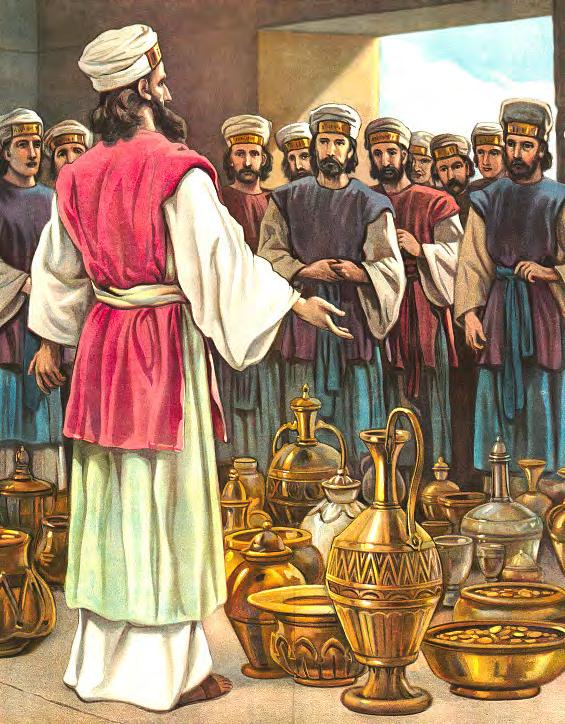



6
THOROUGHNESS
INTRODUCTION GOD ENABLES ME TO
A Priest Wisely Manages His Assignment
A Priest Wisely Manages His Assignment
Jerusalem’s city walls and Temple lay in ruins. Many of the Jews had been taken captive to Babylon because God had judged His people for their sin. Yet God was merciful to His people living in Babylon. Later, when King Cyrus ruled Babylon, the Lord told him to build a house for God in Jerusalem. King Cyrus invited the Jews in Babylon to return to Jerusalem. A group soon set out to build a second temple, led by two priests, Zerubbabel and Jeshua. When the Temple foundation was laid, the people shouted and wept so loudly that the sound was heard far away. Enemies of the Jews opposed the work several times, and consequently, construction halted for years. One day two
1. Who was Ezra? (See Ezra 7:6.) What was he doing before King Artaxerxes gave him a job? (See Ezra 7:10.)
What can you do while waiting for greater responsibility to be entrusted to you? (See II Timothy 3:14–15, Luke 16:10.)
2. What responsibilities were entrusted to Ezra by the king? (See Ezra 7:14–17, 19, 25–26.)

What responsibilities have you been given? How do you manage multiple responsibilities?
3. If the Israelites needed additional resources to rebuild the Temple, what did King Artaxerxes command his treasurers to do? (See Ezra 7:20–22.)
What should you do when you realize that you don’t have everything necessary to complete a job?
4. When Ezra realized that essential people were missing from the team, how did the chief leaders help? (See Ezra 8:17–18.)

When have you participated in a group project? How can you help a leader manage a project well?
5. How did Ezra carefully record what he gave to the
prophets encouraged the people to resume the work. Zerubbabel and Jeshua began again, joined by the prophets. This time their enemies not only opposed the work, but also notified the new Babylonian king, Darius. When he found the record of Cyrus’s proclamation, he told the enemies to leave the Jews alone and even provide whatever supplies they needed! Soon the Temple was completed and the people rejoiced! Whom would God raise up to teach His people? What would a future Babylonian king, Artaxerxes, give this person to manage?
Let’s read the Bible story in Ezra 7:6–28; 8:1, 15–36 and then discuss the following questions.
chief priests before they traveled to Jerusalem? (See Ezra 8:24–25.)
As needed, do you write down steps or things to remember?
6. How much silver and gold did Ezra weigh? (See Ezra 8:26–27.)
During a long or meticulous task, do you persevere? Or do you become discouraged or lazy?
7. What did Ezra specifically instruct the priests to do? (See Ezra 8:29–30.)
What have you been asked to protect to make sure it isn’t damaged, lost, or stolen?
8. How did Ezra ensure none of the gold and silver went missing during the journey? (See Ezra 8:32–34.) Do you check your work to make sure it is complete before you move on to another activity or task?
9. How was Ezra faithful to complete his primary mission? (See Nehemiah 8:1–3, 13.)
What is the proper motivation for anything you do? (See I Corinthians 10:31.)
7
BIBLE STORY
LESSON 1 Carefully Manage My Responsibilities
Revealing the character of Christ through the stories in His Word.
SAVE 20% on any individual Biblical Character Illustrated booklets
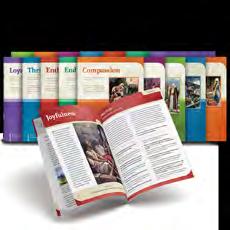
Use coupon: BCICBOOKLET


Biblical Character Illustrated Curriculum
Discover this unique tool that uses the stories in Scripture to illuminate character qualities God wants to develop in the lives of His people. This curriculum contains multiple ways to teach character to kids and give them a vision for building character through faith in Christ!

Single Booklets: $10 each
Complete Set: $379 (SAVE 23%)
OTHER BIBLICAL CHARACTER RESOURCES

Single PDF Download: $3 each
PDF Download Set: $109 (SAVE 25%)
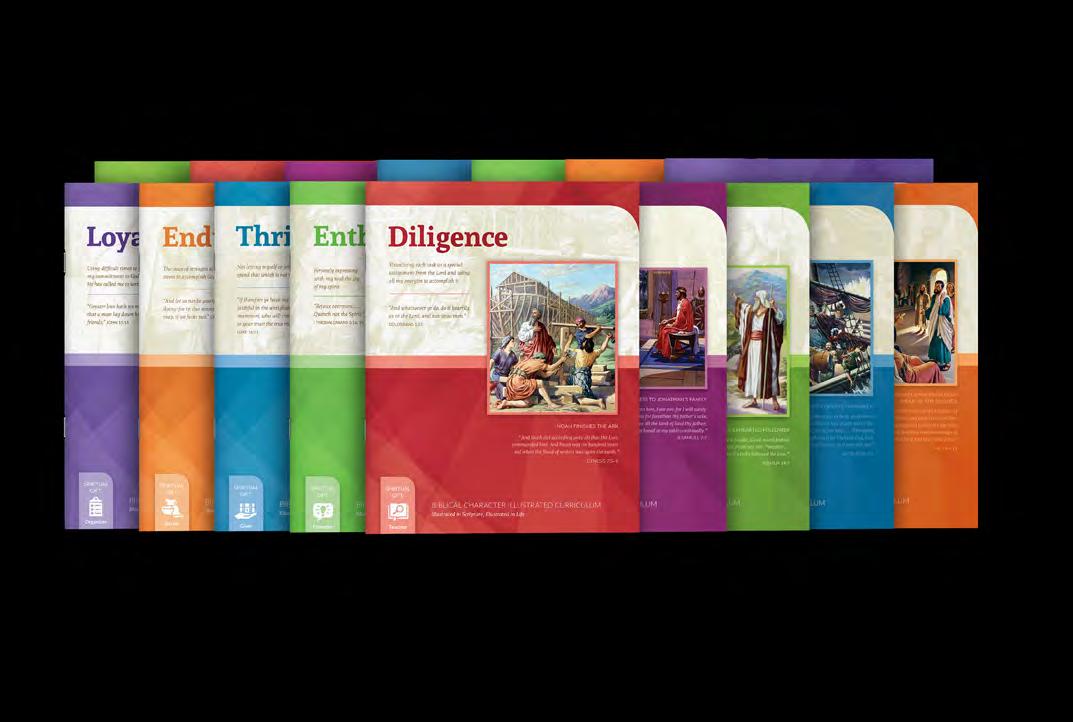
Biblical Character Illustrated 49-Booklet Set
Includes 2 bonus items: Calendar + Understanding Spiritual Gifts

Power for True Success
Insightful, Biblical studies on all 49 character qualities
Hymns for the Family, Volumes 1–4
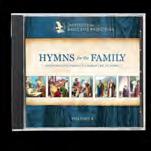
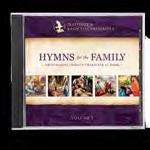
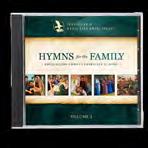
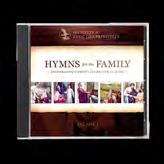
Companion hymns for each character quality
Character Sketches, 4-Volume Set
Timeless resources to show God’s character relfected in creation

Shop these resources at store.iblp.org. • Questions? Call 903-636-9600 or email biblicalcharacter@iblp.org.



























